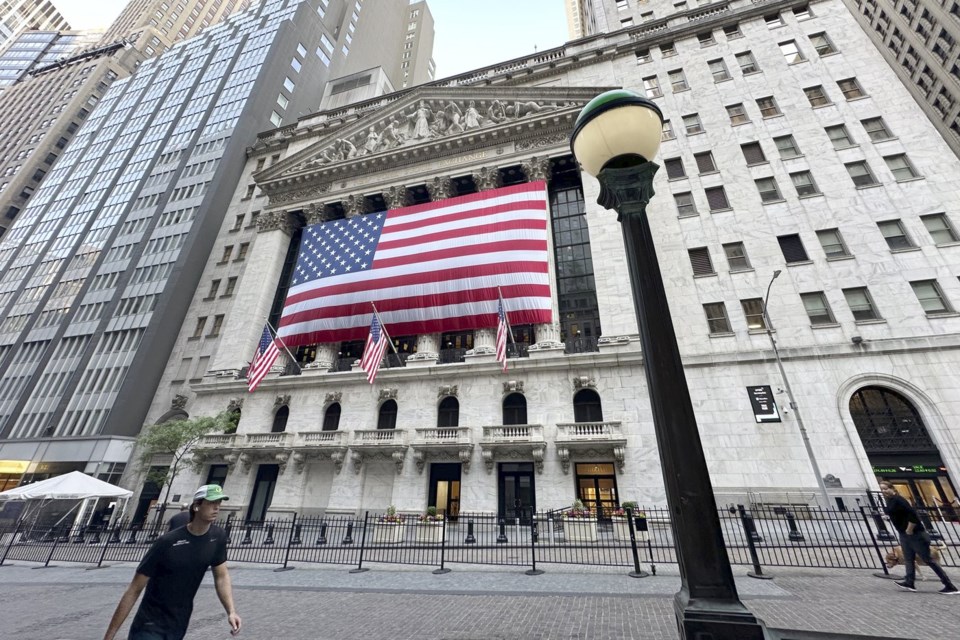NEW YORK (AP) — Most U.S. stocks fell as a tick higher in bond yields tightened the screws a bit on Wall Street following a three-day weekend. The S&P 500 closed little changed Tuesday and is sitting just below its record set a week ago. Roughly two out of every three stocks in the index fell. The Dow Jones Industrial Average fell 0.6%. Some technology stocks remained particularly strong, which helped the Nasdaq composite rise 0.6% to another all-time high. Bond yields rose following a stronger-than-expected report on consumer confidence and the auction of Treasurys.
THIS IS A BREAKING NEWS UPDATE. AP’s earlier story follows below.
NEW YORK (AP) — Most U.S. stocks are falling Tuesday as a tick higher in bond yields tightens the screws a bit on Wall Street following a three-day weekend.
The S&P 500 was edging down by 0.2% in afternoon trading and sitting just below its record set a week ago. Roughly three out of every four stocks in the index were falling.
The Dow Jones Industrial Average was down 300 points, or 0.8%, with less than an hour of trading remaining. But some technology stocks remained particularly strong, which helped the Nasdaq composite rise 0.3% after setting its latest all-time high.
Nvidia was leading the way and jumped 6.8% to bring its gain for the year so far to a whopping 129.7%. It’s still riding a wave created by its latest blowout profit report from last week, which calmed some of the worries that Wall Street’s frenzy around artificial-intelligence technology has inflated prices beyond reasonable levels.
U.S. Cellular climbed 8.6% after T-Mobile said it will buy nearly all of the company. The deal is valued at $4.4 billion and includes up to $2 billion in assumed debt. Shares of T-Mobile US added 0.4%.
GameStop jumped 20.9% after it said it raised $933.4 million in cash through a previously announced sale of stock. The company, whose stock price has often moved more on investors’ enthusiasm than any change to its profit prospects, said it could use the cash for acquisitions, investments or other general corporate purposes.
They weren't enough, though, to offset drops for health care stocks, which had some of Wall Street's sharpest losses. Moderna fell 9.6%, Merck dropped 2.7% and Vertex Pharmaceuticals slipped 2.1%.
The majority of other stocks on Wall Street were also falling. They were feeling the effects of a modest rise in Treasury yields, which can help make everything from mortgages to credit cards more expensive and put downward pressure on the economy.
The yield on the 10-year Treasury climbed to 4.53% from 4.47% late Friday. It had been lower in the morning, but it began trimming its losses after a report showed confidence among U.S. consumers is strengthening, when economists were expecting to see a drop.
Strong spending by U.S. consumers has been one of the main reasons the economy has managed to defy predictions of a recession, at least so far, but some cracks have begun to show. Lower-income households in particular have been beginning to buckle under the pressure of still-high inflation.
Analysts at Bank of America cut their price target for McDonald's on Tuesday, for example, citing its struggles after hiking its prices more than Wendy's and other competitors, among other challenges. McDonald’s fell 1.9%.
Yields climbed further following the auction of Treasurys by the U.S. government. Tuesday's gains cut into the recent easing of Treasury yields, which fell most of this month on hopes that a resumption in the cooldown for inflation will allow the Federal Reserve to cut its main interest rates at least once later this year.
The Fed has been holding the federal funds rate at the highest level in more than two decades in hopes of grinding down on the economy and investment prices enough to get high inflation fully under control. The danger is that if it leaves rates too high for too long, it could kneecap the job market and overall economy. Making it more difficult for the Fed, if it cuts rates too early, it could allow inflation to get even worse.
This upcoming week has several reports that could sway the Fed’s thinking, beyond Tuesday's on confidence among consumers.
The week’s highlight likely arrives on Friday when the government releases its latest monthly report on spending by households and the incomes that they earned. It will also include the measure of inflation for April that the Federal Reserve prefers to use.
In stock markets abroad, indexes fell modestly across much of Europe and Asia. London’s FTSE 100 slipped 0.8%, and Tokyo’s Nikkei 225 edged down by 0.1%.
___
AP Business Writers Matt Ott and Elaine Kurtenbach contributed.
Stan Choe, The Associated Press




